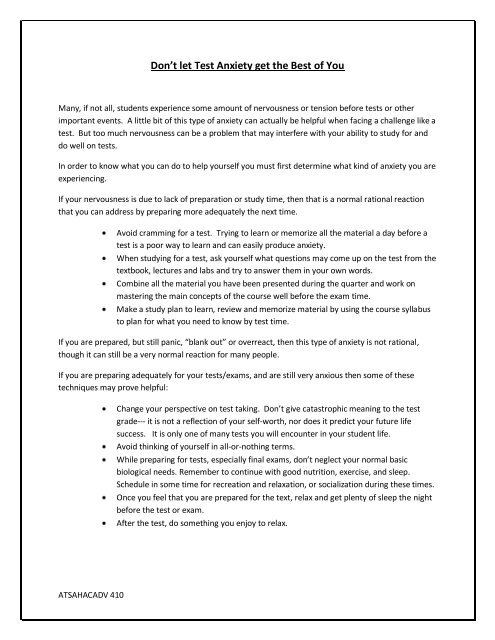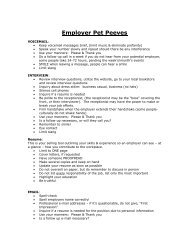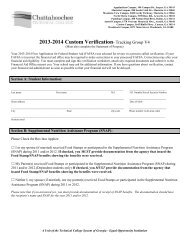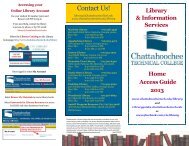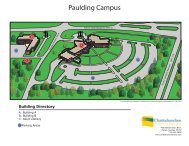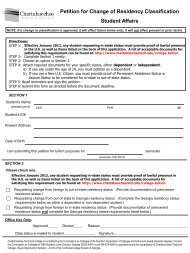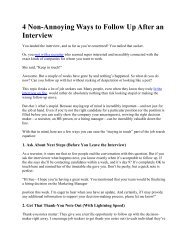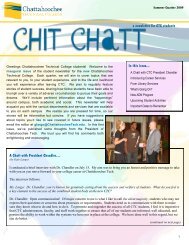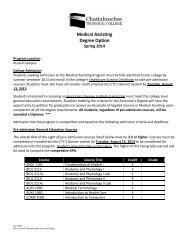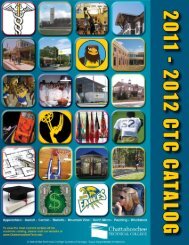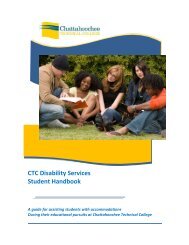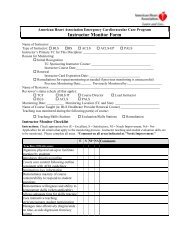Preventing and Working Through TEST Anxiety
Preventing and Working Through TEST Anxiety
Preventing and Working Through TEST Anxiety
You also want an ePaper? Increase the reach of your titles
YUMPU automatically turns print PDFs into web optimized ePapers that Google loves.
Don’t let Test <strong>Anxiety</strong> get the Best of YouMany, if not all, students experience some amount of nervousness or tension before tests or otherimportant events. A little bit of this type of anxiety can actually be helpful when facing a challenge like atest. But too much nervousness can be a problem that may interfere with your ability to study for <strong>and</strong>do well on tests.In order to know what you can do to help yourself you must first determine what kind of anxiety you areexperiencing.If your nervousness is due to lack of preparation or study time, then that is a normal rational reactionthat you can address by preparing more adequately the next time.Avoid cramming for a test. Trying to learn or memorize all the material a day before atest is a poor way to learn <strong>and</strong> can easily produce anxiety.When studying for a test, ask yourself what questions may come up on the test from thetextbook, lectures <strong>and</strong> labs <strong>and</strong> try to answer them in your own words.Combine all the material you have been presented during the quarter <strong>and</strong> work onmastering the main concepts of the course well before the exam time.Make a study plan to learn, review <strong>and</strong> memorize material by using the course syllabusto plan for what you need to know by test time.If you are prepared, but still panic, “blank out” or overreact, then this type of anxiety is not rational,though it can still be a very normal reaction for many people.If you are preparing adequately for your tests/exams, <strong>and</strong> are still very anxious then some of thesetechniques may prove helpful:Change your perspective on test taking. Don’t give catastrophic meaning to the testgrade--- it is not a reflection of your self-worth, nor does it predict your future lifesuccess. It is only one of many tests you will encounter in your student life.Avoid thinking of yourself in all-or-nothing terms.While preparing for tests, especially final exams, don’t neglect your normal basicbiological needs. Remember to continue with good nutrition, exercise, <strong>and</strong> sleep.Schedule in some time for recreation <strong>and</strong> relaxation, or socialization during these times.Once you feel that you are prepared for the text, relax <strong>and</strong> get plenty of sleep the nightbefore the test or exam.After the test, do something you enjoy to relax.ATSAHACADV 410
The Day of the Test or ExamBegin your day with a good breakfast, don’t overeat or load up on caffeine—overeating may make you feel sick or tired <strong>and</strong> too much caffeine may give you“caffeine jitters”.Wear a watch so you can keep track of testing time <strong>and</strong> can pace yourself during thetest.Try to do something relaxing the hour before the exam—last minute crammingcould be confusing <strong>and</strong> cloud your mastery of the overall concepts.Get to the test area early so you are not rushed <strong>and</strong> can find a good seat away fromdistractions. While waiting, get your testing materials ready <strong>and</strong> if you are too earlydistract yourself by reading a newspaper or magazine.During the Exam or TestAvoid; don’t talk with classmates who may add to your nervousness or anxiety.Before you begin answering the test questions, review the entire test. Read thedirections.Organize your testing time efficiently.Work on the easiest portions first.For essay questions construct a short outline for yourself, <strong>and</strong> then begin your answerwith a summary sentence.For multiple choice questions, read all the answer options first, then eliminate the onesyou are certain are not correct. Look for qualifying words like “always”, “only”, “most”.Rely on your first choice.If you feel anxious:o Tell yourself “ I can be anxious later, now is the time to focus on the test”o Replace negative thoughts with more positive thoughts “I don’t have to beperfect.” “I will be able to show what I know on this exam.”o Tense <strong>and</strong> relax your muscles throughout your body.o Take a couple of slow deep breaths.o If allowed, go out of the room get a drink of water.o If allowed, eat something.o If allowed, break you pencil lead <strong>and</strong> then go sharpen it.o Think about your post test relaxing activity.After the Test or ExamMake sure you do the post test relaxing, enjoyable activity that you planned.Try not to dwell on all the mistakes you might have made.Do not immediately start to study for the next test.ATSAHACADV 410
Resources <strong>and</strong> ReferencesGeneral Resources:www.how-to-study.comwww.studygs.netwww.tutorvista.comTesting Resources:www.testprepreview.comwww.atitesting.comTest <strong>Anxiety</strong> Resources:Taking the <strong>Anxiety</strong> out of Testing by Susan JohnsonTest <strong>Anxiety</strong> Prevention by Howard RosenthalNo More Test <strong>Anxiety</strong>: Effective Steps for Taking Tests <strong>and</strong> Achieving BetterGrades by Ed NewmanReferences:The <strong>Anxiety</strong> <strong>and</strong> Phobia Workbook by Edmund J. BourneThe Feeling Good H<strong>and</strong>book by David BurnsTaking the <strong>Anxiety</strong> out of Testing by Susan JohnsonATSAHACADV 410


